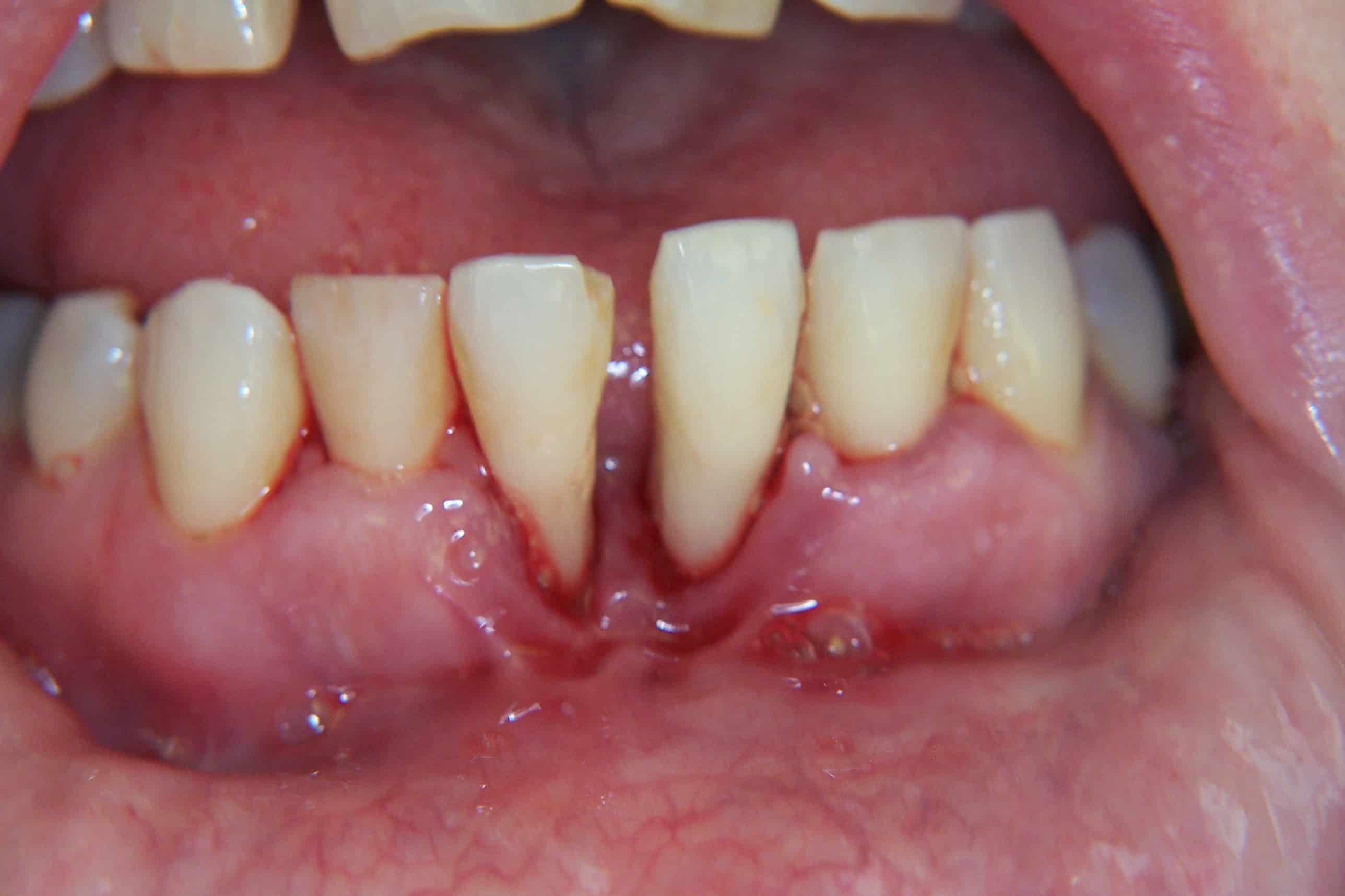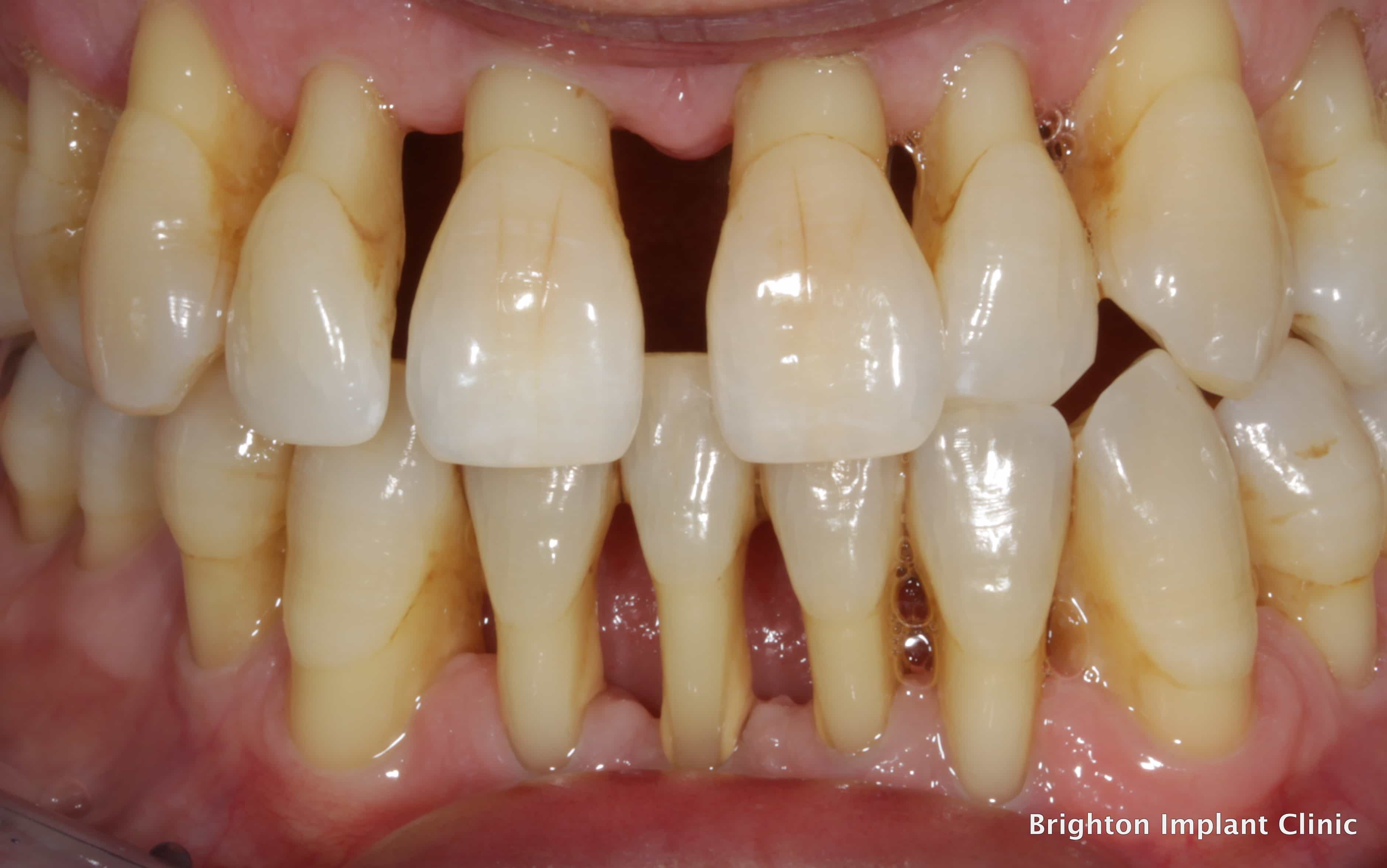
Dealing with tooth loss and Gum Disease can present some very difficult challenges. Everyone wants to save their natural teeth but sometimes spending more time and money on gum surgeries can be expensive and unpredictable. This article goes over how to manage getting implants if you have severe periodontal disease.

emergency dentist abscess 11
Can People with Periodontal Disease Get Dental Implants?
Yes dental implants are very predictable even when there is severe periodontal disease. Severe periodontal disease is a death sentence for the teeth and surrounding bone and gums. Gum disease is a disease of the teeth. Once the teeth are gone the disease will go away and so will rapid bone loss. But slow bone loss will still continue until the missing teeth are replaced with dental implants. Dental implants cannot be done with inadequate jawbone.
The best strategy with severe periodontal/gum disease, is to get a set of dental implant teeth as soon as possible. And before much needed bone is lost to gum disease. Bone loss is an inevitable consequence of teeth loss and gum disease. That is why transitioning to dental implants ASAP is necessary as soon as you are diagnosed with severe gum disease. There are many different ways to do full mouth dental implants.
What is Severe Periodontal Disease and the Link to Implants?
Severe periodontal disease is loss of tooth supporting gum and bone tissue. It is an autoimmune disease of unknown or misunderstood origin. It is a genetic disease. Severe gum disease cannot be prevented or stopped, but only slowed down. At least not until all your teeth are removed or they get loose and fall out. Gum disease is a disease of the connection between teeth and the jaw bone. This connection is called the periodontal ligament or “PDL.” Once the teeth are removed, the disease will go away since there is no longer PDL. If the teeth are not removed, bone will continue to be lost. It can become difficult if not impossible to get dental implants once periodontal disease progresses and precious bone is lost.
Contact Dr. Adams for a complimentary implant consultation including 3D Xray
Dental Implants and Periodontal Disease Video:
Severe Compared to Mild Periodontal Disease
Severe gum disease is not to be confused with other milder forms of gum disease caused by dental neglect and teeth clenching. Some conservative holistic dental treatments exist such as dental ozone and PRF. And can be considered with mild and moderate disease.
Mild and Moderate Gum Disease Treatment:
- Deep cleanings
- Removing amalgams with toxic mercury among other irritation metals. Copper, silver, tin are all corrosive metals in amalgam silver fillings.
- Treating clenching and grinding problems. Heavy pressure on the gums leaves them chronically inflamed and causes recession. While teeth clenching will not cause gum disease, it will accelerate and fuel it.
- If you clench your teeth and you have amalgam fillings, that is double trouble.
Replacing Teeth with Implants with Severe Gum Disease
If you have severe gum disease, you will lose most of your jaw bone while your teeth get loose and fall out. There are treatments for periodontal disease, but many people will still lose their teeth after spending thousands of dollars on gum surgery that is not guaranteed to cure gum disease. You should consider removing your natural teeth and replacing them with implants before this happens. Act now while you still have enough bone for implants. This may seem like an aggressive action, but once the teeth are out, the disease process stops. The sooner you get the teeth out, the less bone the disease will destroy. Placing implants will preserve the remaining bone. And the dental implants will serve as a great teeth replacement option. Most people with severe periodontal disease will need to explore the options to replace all teeth with implants.
Localized Compared to Generalized Gum Disease
Periodontal disease usually will either severely damage all the teeth or just some of the teeth. The damage is done by way of severe bone loss to the point teeth get loose and fall out. The disease in the case of localized gum disease, is usually limited to the very front teeth and the first and second molars.
Removing Teeth will Prevent More Bone Loss and Improve Implant Prognosis
In cases of severe gum disease, it is best to remove the teeth and replace them with permanent implants. For the case of full mouth gum disease, it is best to remove all the natural teeth and replace them with full mouth implants before loss of valuable bone occurs. Full mouth implants are generally done in one of two ways:
- Fixed or “permanent” dental implants called All on 4 or individual implant teeth and small implant bridges.
- Removable Snap-on dentures
You need Teeth to Remain Healthy
Your teeth play a vital role in your general well being. Our usual goal is to save your natural teeth at all costs. However, gum disease and periodontal disease weakens your teeth if proper cleaning and tooth brushing is not maintained. Teeth are held in position with the help of special natural fibers or ligaments. These periodontal ligaments surround your teeth from all sides and help in chewing and biting food. When gum disease starts, it can be stopped with the help of simple treatments. But if gum disease progresses and involves ligaments and lots of bone support around teeth, it is wiser to remove diseased teeth and place dental implants.
Preventing Bone Loss is Necessary for if you want dental Implants
No bone and no implants. It is that simple. Healthy socket bone is of prime importance for getting successful dental implants as replacements for natural teeth. It is the socket bone which will cover the dental implant and hold it for life. It is the socket bone which will make a biological connection and grows inside the spaces around dental implants. No periodontal ligaments are present around dental implants. Socket bone preservation will ensure future success of dental implants and restoration of your smiles, eating, chewing, biting and all functions of teeth. If you lose this important bone, you may never be able to get implants.

what causes periodontal disease
Should I Remove Teeth if I have periodontal disease?
If your dental health care provider examines your teeth and tells you that periodontal disease has progressed to the extent that its outcome is hopeless, then you should definitely opt for removal of such teeth. This is very important as diseased periodontal ligaments will start to damage the bone tissues around the diseased teeth and it will become difficult to get successful dental implants in future.
Will Implants be Possible in the Future
You should choose an expert dental implant surgeon with experience of dealing such cases. It is very important to save socket bone during removal of these hopeless teeth. Your implant surgeon should be careful and should have the knowledge to deal this situation. Teeth clenching can contribute to gum disease. How to stop jaw clenching?
How long should I wait for dental implants
It is best to go for immediate placement of dental implants (if at all possible) after removal of diseased teeth. No time should be wasted for preserving maximum quantity of socket bone for success of dental implants. However, if your implant surgeon feels that it is necessary to give some time for healing of disease, you must follow his instructions. Are implants possible after periodontal disease? Can someone with gum disease get implants? It all depends on if there is adequate healthy bone remaining.
What if periodontal disease is ignored and I do nothing?
- Problems with eating, drinking, speech & basic functions of teeth.
- Loss of confidence at work.
- Loss of self-esteem.
- Shifting and tilting of teeth in empty tooth socket spaces created by lost teeth causing difficulty of replacement in future.
- Food impaction in empty spaces causing gum and bone diseases.
- Over-eruption & elongation of opposing teeth causing poor appearance and eventually loosening and mobility of teeth.
- Problems in normal tooth contacts and bite.
- Loss of jawbone and impaired ability to get implants in the future.
Will dental implants be possible in the future?
Healthy socket bone in your jaws in necessary for the success of dental implants and it should be preserved at all costs by removing diseased teeth as early as possible. If periodontal disease progresses and damages jaw bone, you need to get an additional artificial bone grafting therapy for the restoration of healthy socket bone. Your implant surgeon will thoroughly examine the condition, height and quantity of bone and will decide whether there is need for placement of artificial bone before dental implants or not. dental implants after periodontal disease.
What is Periodontal Disease?
Periodontal Disease is the most prevalent chronic disease in the world. Periodontal Disease also called Gum Disease is the leading cause of tooth loss. Gum disease starts when normal oral bacteria forms on teeth where the gum line meets teeth. In response to bacteria accumulating at the gum line, the gums become inflamed. The initial phase of the disease characterized by swollen gums is called Gingivitis. During “Gingivitis” the bacterial accumulations are above the gum line. Gingivitis progresses to Periodontitis when bacteria eat away the gum attachment to the teeth and move down below the gum line where they wreck havoc and eat away tooth-supporting bone. So there you have it, Periodontal Disease is that simple or is it?
Gum Disease is Complex and Autoimmune
Periodontal Disease is not simple, but rather it is more of a complex Autoimmune disease. When bacteria colonize (aka “Plaque” or “Tartar”) below the gum line they release Toxins and cause bone and gum inflammation. The bacteria and toxins also can enter into the blood stream through the thinner tissue below the gum line and cause or contribute to other systemic disease. During Gum disease progress, the immune system begins to turn against the teeth. The immune system initiates an attack on the teeth where the bone is resorbed from around the teeth and the teeth eventually get loose and fall out. Sometimes the disease attacks all the teeth, but often it is just some of the teeth. Periodontal disease does not affect all people all people the same way. In fact, some individuals with poor oral hygiene may get only a mild form of Gingivitis that never progresses to irreversible periodontitis. Periodontal disease, like many other autoimmune diseases, has a genetic component, as certain individuals are more likely to get it than others.
Factors Known to Make Periodontal Disease Worse:
- Tobacco Use
- Genetics
- Stress
- Medications
- Clenching and Grinding of Teeth
- Diabetes
- Poor Nutrition
Periodontal Health and Diet:
Diet is important in controlling periodontal disease because bacteria in your mouth use sugars for energy and reproduction. When oral hygiene is poor and the diet is high in sugar, there will be lots of growth of disease progressing bacteria. Stress is also a major factor. Stress + Sugar = lower acidity in the mouth and an increase in Gum Disease.
The human body needs vitamins and minerals to help regulate our metabolism. A diet high in fiber and fruits and vegetables will help reverse periodontal disease naturally. Essential Fatty Acids and Proteins provide the energy to help build vital cells. To reverse gum disease naturally, we to discipline ourselves to maintain healthier eating habits (stay away from processed foods) and keep stress to a minimum.
Vitamins and Supplements for Gum Disease:
Vitamin C
Vitamin C is an important vitamin for healthy gums. it appears to fight bacteria and promote the formation of new healthy gum tissue. Vitamin C also reduces inflammation and infection during the progression of periodontal disease. Vegetable high in Vitamin C include Oranges, Grapefruit, Tomatoes, Broccoli, Cauliflower, Cantaloupe, Strawberries and Asparagus. Recommended daily dose of 1000mg 3x per day
Others:
- CoQ10 @30mg 3x per day
- Vitamin A @10,000 I.U.
- Vitamin E @400mg 1x per day

 (301) 421 1996
(301) 421 1996 burtonsvillesmiles@gmail.com
burtonsvillesmiles@gmail.com